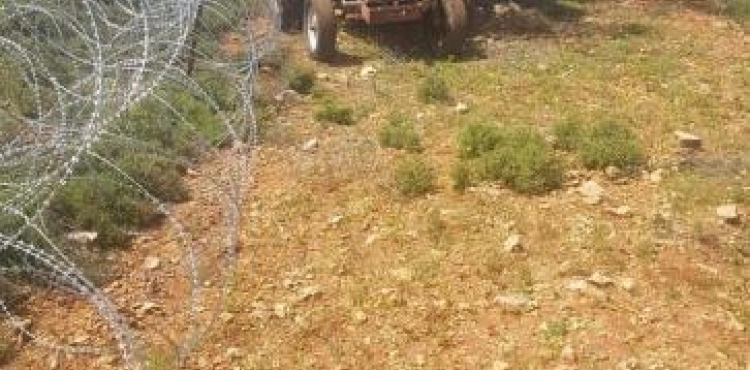is no longer immunity for Palestinians in their lands adjacent to their homes, which are home gardens for them, in light of the orgy of occupation soldiers and settlers, who prevent them from planting and plowing olive seedlings.
Abdel Rahman Ahmed, from the town of Asira al-Qibliya, south of Nablus, was attacked by the occupation soldiers, who prevented him from planting olive seedlings in his land adjacent to his house on the outskirts of the town, and under the threat of weapons he was expelled from his land after a verbal dispute with the soldiers who threatened him with death if he did not leave for His near house.
Hafez Saleh, the head of the Northern Asira Local Council, tells Al-Quds: “This matter is no longer surprising in light of the incursion of settlers and the civil administration into the lands of the town surrounded by settlements and the bypass road known as the Yitzhar Road. The citizens’ lands located in areas (C) It is prohibited to cultivate and exploit it, as it is by virtue of confiscation without issuing decisions to do so. Citizen Abdel Rahman Ahmed, his land adjacent to his home, and the separation between them is a classification between (c) and (b) a zero distance, except that he was prevented from his land and planted olive seedlings, and this was repeated in several areas in the region, They target our land and prevent us from accessing it. "
Saleh stressed: "We are in a daily confrontation, and in the Corona pandemic the situation has become ripe for exploitation by the occupation forces and the practice of its racist aggressive policies."
In the village of Qaryut, south of Nablus, Bashar Al-Qaryouti, who specializes in settlement affairs, says: “What settlers and occupation do in light of our preoccupation with the epidemic is controlling our lands and building the fence gradually over them. Annually losing part of their land, only to find that their land has become a settlement. "
Al-Qaryouti added: "The owners of the lands are expelled from their lands near the security fence that was placed in their land, knowing that this area is not subject to coordination or permission from the occupation to enter it, but the occupation is trying in various ways to terrorize the farmers and expel them to control their lands, and recently, settlers from a settlement were recently monitored Shilo put mobile caravans in the village of Ras Muwais, which belongs to Qaryut, where they took advantage of the current conditions, closures and the inability of institutions to follow through to impose a fait accompli and establish settlement outposts.
Al-Qaryouti points to a serious issue in the light of the Corona crisis, saying: "There are cases in Shilo settlement of the epidemic near the village of Qaryut and the neighboring villages. In light of the Jewish holidays, settlers spread daily in the area and on springs in the town, and there are warnings published by the emergency committees, including Not to touch anything or use it, and the necessity to wear gloves in these locations, which are: Al-Sahlat, Qaryut Spring, Ceylon Spring, Al-Murabba, the Eastern Plain, Al-Qurna, Bataysh, Al-Mujah, as these sites come to settlers constantly.
Al-Qaryouti expert refers to what happened in the last days in the region, saying: "Organized crime by the occupation and exploitation of the difficult conditions that our people suffer from, as more than 30 large olive trees were uprooted in the Western Karm and Al-Khala area in Qaryut, in addition to expelling many citizens from Their lands and preventing them from plowing under the pretext of lack of coordination, knowing that the townspeople were informed of the direction today to plow in the western region near the settlement of Ayla, as this is a policy of failure and sabotage to empty the land from its owners. "
In addition, many citizens in several towns and villages complain of the occupation soldiers assaulting farmers near their lands on the security fence of the settlements, holding them for several hours, confiscating their vehicles and agricultural tools, and threatening them with death if they return again to the place.












